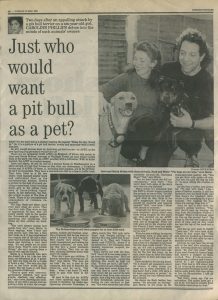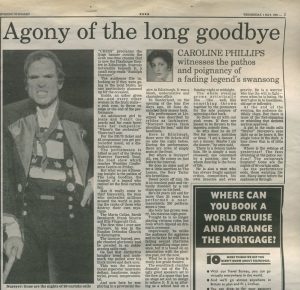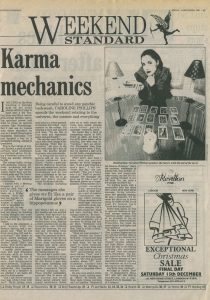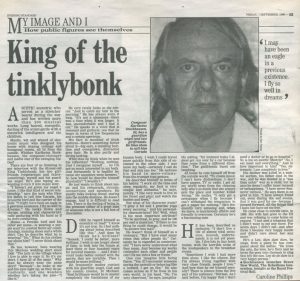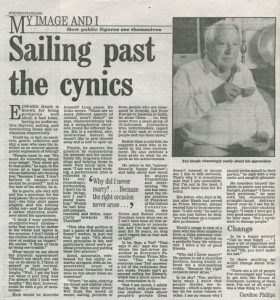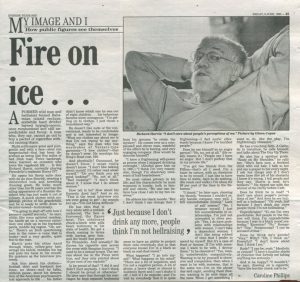Maltese teaser
Evening Standard | 31 May 1991
International and egghead author of 34 tomes including Handbook for the Positive Revolution and I am Right You are Wrong. Self-contained and quiet Maltese originator of lateral thinking who can write an entire book on the London to Sydney flight.
View transcriptInternational and egghead author of 34 tomes including Handbook for the Positive Revolution and I am Right You are Wrong. Self-contained and quiet Maltese originator of lateral thinking who can write an entire book on the London to Sydney flight.
Visionary and pundit who thinks about thinking, talks about thinking and lectures about thinking. Curious-minded, gentle and clever TV performer who, er, thinks he’s descended from Napoleon.
This is Dr Edward de Bono-or Bono de Edward if you want to think about it another way. The man who once had four working breakfasts with four different people before 9.30.
He’s wearing sober suit, striped shirt and de Bonoed tie. ‘Because I work in the field of creativity,’ he says, ‘I don’t want clothes that say ‘aren’t I creative-looking?’ That has a negative effect.’ Curiously, he cites advertising men’s open shirts and medallions as an example of such creative garb.
He travels a lot and likes to carry his luggage with him. So he holds on to one navy suit and wears the other. ‘To show that I’ve changed, I wear very bright ties. Then the focus is on my tie.’
He finds it extremely difficult to find striking ties, so he’s started to make them himself. ‘There’s a very simple way of doing it. Well, you take a long tube and you fold the top in two halves . . .’
On his mantelpiece are little fluffy toy ducklings, Hindu artefacts, pots of pollen and so on. And then there are books and papers everywhere. He sits in an armchair, emphasising with his right hand while his left eyebrow moves up and down; hand movements that he reckons he adapted to the early days of television. ‘If you used your hands a lot, they’d pop in and out of frame.’
He tends to use Americanisms. And he speaks in the voice of a smart Englishman; a lovely rich and even-toned voice. ‘I suppose I have a calm voice that shows I don’t get antagonistic or worked up.’ Certainly he appears equanimous.
He looks like the doctor he is. He has nice, swarthy Maltese looks (which he says come from his Irish grandfather-shipwrecked Armada chappies swimming ashore and all that), a touch of the genial uncle, a receding hairline, a bit of a tummy and hirsute hands. ‘I think I look a bit like Saddam Hussein,’ he laughs. ‘Dark, I mean . . .
‘And I think I weigh more than I should,’ he says, with his hand under his lip. Characteristically he looks down to speak. ‘One’s writing and getting bored so one eats whatever’s put in front of one.’ He squirms in his chair talking about his overeating. ‘I look very ordinary. Tallish, not stocky and intelligent-looking, I hope. I’m neither florid nor muscular, of football or wimp build.’
So why-in seemingly underconfident gesture-does he turn away to talk? ‘Interesting . . . The reason for doing that is so that when you look back it makes more of a point.’ He punctuates with a look at me.
He likes to categorise himself as a thinker. ‘Of course, some people think I’m mad. And others just think I’ve just done very well with a simple idea,’ says the lateral thinker who wakes up in the morning with ideas for improving his coffee percolator and irrigating the Sahara.
Ask him to describe himself and a smile crosses his lips. He has a rather sluggish feel to him, perhaps he’s slightly lonely, and he doesn’t dazzle with brilliance. He’s genial and mild. And with the practicality of a doctor.
‘I’m interested in designing. I’m active, constructive, positive, easy-going, calm, sensitive and simple.’ More? The son of an entrepreneurial, active mother and pensive father laughs. ‘I’m interested in things, curious, very bored by chores and administration, organised, disciplined and not neurotic.’
And what does he most value in himself? ‘Three things’-he looks up-‘My being constructive, curious and striving to end up with something as simple as possible.’
And what does he most dislike? ‘My overeating, that sometimes I run out of energy and, probably, my laziness. Also I’m probably not ruthless enough.’ He says he’d like to be hypermanic. Does he lack energy? ‘Yes. I’m just driven by interest in what I’m doing,’ says the man who once said he could well do without cinema, theatre or galleries. And is he easily bored? ‘Not by people. I suffer fools gladly.’
Does he think he’s brilliant? ‘No. I think I’m more interested in thinking than other people. Sometimes I can see things more clearly. And I’m more able to hold onto different points of view at the same time.’ So speaks the Rhodes scholar whose books have been translated into 24 languages. And how many marks out of 10 would would he give himself for his thinking? ‘About four.’
In one year he spent 230 days away from his wife. That, he says, is the nature of his work. ‘I think that families settle down into the modes that are available.’ One assumes he doesn’t have a close relationship with his wife. But no: he looks at things in a different way.
‘Relationships that are very enduring don’t depend on whether you’re around or remember their birthdays or whatever,’ he says, citing the example of a friend who he called in Sweden after a 25-year break. They spoke as if they’d talked the day before.
‘It’s probably true that I don’t have intense relationships. I regard those as a hassle. I hate the demands. There are lots of things I’m interested in and want to get on with.’
So people aren’t important to him? ‘They are. But not on the level of needing them. I grew up in a big family and you learn to be independent. You develop your ways of dealing with the world. You certainly don’t rely on anyone or expect people to do things for you.’
So is he lonely? Sitting in his chilly chambers in the Albany, he shoots me a challenging look. ‘Not really. Only in the sense that you travel. Not lonely in the sense of sitting around saying ‘poor me, poor me.’’


